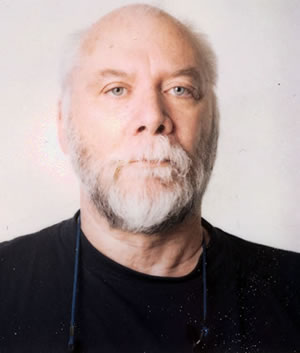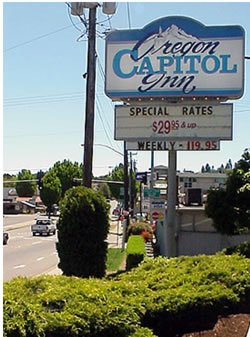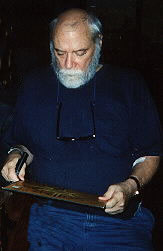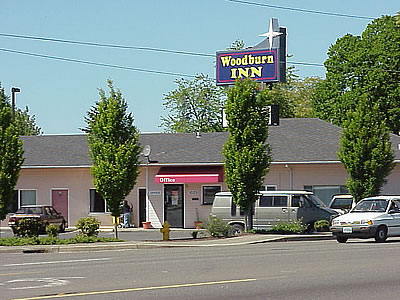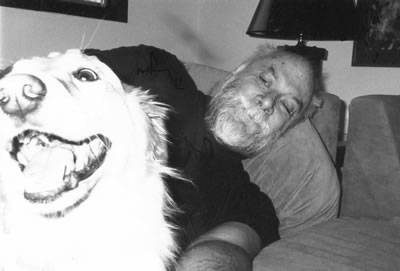|
I
I had gone down to
Salem to interview Mr. John Fahey. He was living in the Oregon Capitol
Inn, a nasty sort of welfare-hotel, at the time. I had spent a long
hot day driving him around, talking, going through the used record shop
routine with him, and we had wound up back at his place. I was distractedly
reading a book I'd picked up off the floor and trying to decide what
to do; I had come down with the intention of staying a couple of days,
but there was no way I was going to sleep in my car in the parking lot
as originally planned, because it looked genuinely dangerous. He'd offered
to let me sleep on the floor, but clearing a space would be a major
undertaking, and anyway, he'd mumbled something about bugs; I wasn't
sure whether he meant fleas or roaches, but the prospect of either was
none too thrilling. I couldn't afford a hotel room, so I pretty much
figured I was heading home. I wasn't paying much attention when he said
he was going to wash up, and I didn't even look up when he asked, a
few minutes later, if I'd seen a pair of black shorts lying around.
Then he asked me to help him find his pants, and I looked up to behold
his pink rotund nude bulbosity, I still wake up screaming.
|
|
|
|
That
was by no means my only traumatic experience at the hands of Mr. Fahey.
The interview I wanted to do came about as a result of the first. After
years of ignoring and passing up opportunities to see him play live in the
Seattle area (mostly from sheer laziness), I'd finally gotten up the gumption
to see him do a show at a since-closed art-poet-goth club, opening for Nels
Cline. I got there late, and walked in to find his set under way. There
were about 20 people listening intently, and a lot of others playing pool
and drinking, seemingly oblivious to Mr. Fahey's music. He was playing really
well, and I was knocked out by a long piece that later turned up on 'City
of Refuge'. But something seemed off, even though I'd never seen him before.
I had, since 1970, cherished a notion of Mr. Fahey as a loquacious, charming,
intellectual wit, and the man on stage never said a word or acknowledged
the presence of his audience; he could easily have been a blind man unaware
he was playing for anyone at all. After 30 minutes or so, a young man walked
on stage and whispered in his ear. Mr. Fahey nodded, finished the tune he
was playing, and walked off the stage. I was startled, but I was in a hurry,
so I walked out the front door and almost collided with the man himself,
standing on the sidewalk and staring up at the sky with his shades still
on. We talked for a couple of minutes, mostly inanities, and I went from
feeling startled to devastated. His speech was slow and slurred; he seemed
humorless, drugged or brain damaged or something. While we were talking,
a frat-boy type walked up and literally shouted at the side of Mr. Fahey's
head, 'You're a fucking icon John', and he didn't even flinch. Well, as
it happened, he was pissed as a result of finding out just before he went
on that he wasn't getting paid, and he probably was drugged, but I didn't
know any of that for a long time, and I was depressed for weeks afterward. |
| Fahey!
I lived in Maine when I first heard of Mr. Fahey; I was a military dependent
whose best friend had escaped the exile of an almost-Canada air base and
moved to the Bay area. He loved the Grateful Dead, but I bought the first
LP and did not share the feeling. He loved Fahey, too, and Fahey was something
I could appreciate. I was already into Canned Heat, and when Fahey turned
up on 'Living the Blues', it seemed to confirm something. I had discovered
Skip James, the greatest of blues singers and guitarists, on a 'Blues at
Newport' LP in the base library. Later, crossing the country on a nightmarish
drive with my brother and drunken father, I heard on the radio of the death
of Al Wilson. The threads of my interest in Fahey started coming together
almost 30 years ago, but it was comparatively recently that a few last events
provoked in me a desire to meet and talk to the man himself.
|
| What
makes one wish to meet the creator of art one admires? Well, I can only
speak for myself, but, generally, I don't. I used to…for the same reasons
as anyone, I suppose. When one hears music that provokes emotion (whatever
it may be), it is difficult not to suppose that the creator must share your
view of life, or some such idiocy; difficult, that is, unless one has had
the experience of spending some time with the object of your admiration.
It is remarkable how quickly one can be disabused of such silliness by subjecting
oneself to moronic, egotistical knuckleheads; as a youth I thought doctors,
lawyers, and musicians must be geniuses. Whatever. I wanted to meet Mr.
Fahey for reasons other than loving his music. Mr. Fahey had been a good
friend of Al Wilson. Mr. Fahey had 'discovered' Skip James, and been instrumental
in 'reviving' his career, and now his one-time friend Stephen Calt had published
a book about Skip James which presented a scathing portrait of Mr. Fahey's
role in that episode. Mr. Fahey had included a full page picture, with no
explanation, of Walter Kaufmann, my favorite philosophical writer and Nietzsche
translator, in an amusing book called 'The Best of John Fahey 1959-1977',
which I had recently come across. Mr. Fahey had reportedly become a Christian
in the 70's. Mr. Fahey had reportedly become a member of the Church of Latter
Day Saints, that most exquisitely demented of modern mainstream religions,
in the 80's. Mr. Fahey had presented himself to me as someone shockingly
unlike what I had expected in a chance encounter. When Mr. Jeff Smith proposed
that I interview Mr. Fahey for this magazine, it sounded like a good idea
to me. |
When
I walked into his room at the Oregon Capitol Inn, my first thought was that
he'd been burgled. The floor was a foot deep in debris: books, records,
CDs, food, papers, musical equipment. The bed was piled with junk, and the
headboard lined with prescription bottles. Mr. Fahey introduced me to Randy,
a guy in his mid-20's given to interrupting conversations with unintentionally
amusing non sequiturs like the title of this article. Apparently they had
met in a Union Gospel Mission at a time when Mr. Fahey was particularly
down on his luck. Randy was surly, stiff-necked, and lacking any sense of
humor. I was puzzled by his presence until much later when I realized that
he was there as 'security', as an ameliorative for Mr. Fahey's insecurity.
We'll have no further truck with him. We talked about a lot of music business
stuff. He had just finished recording a cd with Cul de Sac and he had a
lot to say about what a horrible band they were and what an unpleasant experience
the recording sessions had been. He declaimed at length about what an asshole
Ray Farrell is. He spoke with regret about the badness of the recent recordings
of *** *'******, because he likes *** *'****** very much and wished he liked
his newer music more. He reminisced amusedly about his recent tour with
Thurston Moore, and the anger Thurston Moore displayed when Mr. Fahey advised
him to stop trying so hard with his guitar playing, because it just wasn't
working. He said, in response to my query, that Thurston Moore was not mentally
retarded. We talked about a lot of other stuff that is old news now, like
Antonioni soundtracks and recordings with the Red Crayola. He suggested
that we hire a prostitute to give us blowjobs, and then agreed that it wasn't
that great an idea."
|
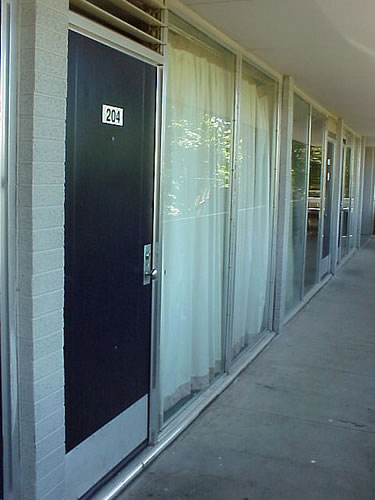
Room 204 at the Oregon Capital Inn, the last place John resided.
|
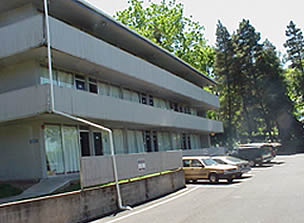
Second
story,
right middle door |
Then
I brought up Skip James. I described how pleased I'd been to hear Skip James
themes in 'City of Refuge', and he said he didn't think anyone would recognize
them, and maybe he should send some money to whoever owns the copyrights.
I said that wasn't really what I was getting at, but how did he feel about
Stephen Calt's portrayal of him as avariciously motivated in his dealings
with Skip James? He seemed startled that that was how I had read what I
thought was explicitly stated, and denied that it was ever the case. He
said anyone who thought they could get rich off a blues singer would have
to have been crazy. He said that Calt still resented him because Calt had
run off with Fahey's wife while Fahey was in the hospital. He described
Skip James as a horrible, arrogant, rude person whose painful death was
due him. I tried talking with him about Calt's discussion of 'folk' musics,
but Mr. Fahey muttered about middle-class college students pretending to
be hillbillies and Negro sharecroppers (ever wonder why he wore those suits
and ties in the 60s?). |
| I
dragged out a CD I'd brought with me, I'd come across it at work in the
'music' 'library', 'Christmas Guitar with John Lahey'. It was technically
accomplished, musically correct, artistically awful renditions of Fahey-identified
Christmas songs that did not at all ape his style; it was good for a few
laughs. I wanted to talk to him about his creative process, to contrast
him specifically with Stefan Grossman, his much less interesting and involving
contemporary…I suggested that what I saw as Grossman's mechanistic,
cut-and-paste approach to incorporating themes from old bluesmen into curiously
bloodless tunes was in dramatic opposition to his own organic, subconscious
approach; his response was a fart noise at each mention of Stefan's name.
He plugged in an electric guitar and gave me a heavily reverbed demonstration
of some Skip James chords, and then played 'Juana', the overwhelmingly beautiful
tune I'd heard him play in Olympia a few months before. |
|
| He
said he was tired and wanted to sleep, and I got off the bed so he could
lie down. We continued talking; Mr. Fahey has eyes that are both penetrating
and strangely weak in their gaze, and he stared intently at me as he told
me of the frustration of being pursued for more than 30 years by people
who thought he was a guru of some sort, people who thought their emotional
response to his music meant that he had something to tell them, people who
wanted something from him that he didn't have and didn't want to give them.
He didn't understand what people were talking about when they tried to tell
him how his old music made them feel and what they thought it meant. He
hated his old music, he wanted to do something different and he wanted people
to be interested in it. He said his reputation as a misanthrope was all
wrong, he just couldn't stand being around stupid people, he needed to be
around intelligent, stimulating people. I listened to him and I felt disoriented
and at a complete emotional loss. I wasn't sure if he was telling me these
things because he thought as a 'music writer' I could make them known to
the wider world (he seemed to have a grandiose notion of what I might be:
he'd seen a copy of the magazine, I had explained to him the size of the
print run, but even after that he'd been surprised when I'd had to tell
him that I had a full-time job and wasn't on an expense account) I wondered
if he just needed to vent his frustrations to a neutral observer. I found
after spending the day with him that I liked him very much. He was intelligent
and witty; he was a good talker. For all I knew, he liked me too and was
saying these things as an overture to friendship. I have been accused of
being a cold, emotionless pod or a robot, or even of being of English ancestry,
but I didn't know what he 'meant' (it's always possible that he meant just
what he was saying) and I didn't know 'how' to respond. " I'm very
lonely", he said. "Hunh", I said. |
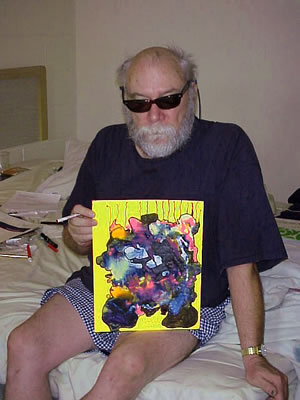
John Fahey displaying one of his spectacular paintings
in his room at the Woodburn Inn. |
|
II
We
were in relatively frequent contact over the next few months. One night
he called at about 1:00 AM; he told me he was getting married the next
week, and wanted to know if I could come down for the wedding. He'd been
talking for a few months with a woman from Colorado named Rebecca who
was writing a book about Alan Wilson. She claimed to channel his spirit.
She would be there in a couple of days and they were going to get married.
He wanted to know if he could borrow $25 so they could afford to eat.
When I next spoke to him, the wedding was off. She'd stolen some notebooks
with Al Wilson material and left town. He muttered ruefully that if she
were really channeling Al Wilson's spirit, you'd think she could get the
words to the songs right.
|
|

A tree farm a short distance south of Woodburn on 99E looking northward.
Mt.
Spankley, as John liked to call it, can be seen in the distance |
He
sent me a box of papers to aid in my writing this article. It weighed about
10 pounds, and was a remarkable disassemblage of hundreds of random manuscript
pages, letters to and from many people, official documents, drawings, comic
books, tapes, and artificial sweetener packets. It looked like he'd cleaned
his room into the box. About two weeks after I received it, I came home
one day to a message on my answering machine from Dean Blackwood; he said
he understood that I was in possession of the only copy of an article Mr.
Fahey had written, 'The Origin and History of Bluegrass Unlimited Magazine'.
He needed it for inclusion in a book that was to be published imminently.
I spent hours poring through the box's contents, finally putting together
what seemed to be the desired manuscript. My task was complicated by the
fact that about halfway through the narrative, the story split into two
directions, and was continued on two separate sequences of unnumbered pages.
I mailed it off to Mr. Blackwood and that was the last I ever heard about
it. |
| The
Cul de Sac LP finally came out, and Mr. Fahey was pretty pleased with it.
I suggested that the electric 'rock' guitar parts were too dreadful for
words, and he agreed, but he was in general so happy with it that he said
he'd make another record with them if the opportunity presented itself.
Not long after that conversation, I saw an ad in a Seattle music paper for
a Fahey/Cul de Sac show at a midsize venue. The next time we spoke I mentioned
it, and he was obviously surprised; he'd only been told there was to be
one show, in Portland, and the more he talked about it, the angrier he got.
I went to the show, and he never showed up, which annoyed me no end, not
so much at not seeing Mr. Fahey play, but at having to sit through a very
regrettable Cul de Sac set with no payoff. He said later that he had actually
walked into the place, but then turned around and left, because it was 'too
gay'. |
|
|
I
decided, despite having been assured by Mr. Fahey that our interview was
'the best he'd ever done' and that I had 'asked all the right questions',
that I needed to follow up on at least one subject. I had never really delved
into what I thought were some probably unanswerable, but nevertheless interesting,
questions. Most of Mr. Fahey's music has for me and seemingly most listeners
a huge emotional impact. He started playing his music at a young age, and
has continued for a very long time, with a remarkable consistency of artistic
approach. I was interested in asking him what it meant for him. What was
he trying to do? Was there any difference for him between performing and
recording and composition? Was there any such thing as 'pure primitive forms'
of folk music? How does what he is doing compare with that? What happens
when a self-conscious academic/intellectual gets involved in 'art'? What
did he want to do with music as a performer? What did he want from music
as a listener? How did he think that what he did as an artist could be compared
to Jimmy Giuffre? Or Derek Bailey, my other favorite guitar player? It was
all kind of vague, but I hoped by talking through it we could figure out
what I was asking, and what, if any, the answers were. |
| I
went down to see him in Woodburn, where he'd moved the same weekend as the
Cul de Sac no-show. I walked into a room filled with the same litter as
before, overlaid with a heavy miasma of paint fumes. He was heavily involved
with painting, small abstract pictures, some of which I liked very much.
He seemed oblivious to the fumes, but I wasn't, and I suggested we go out
to breakfast before I passed out. There I saw, for the first and I hope
last time, someone (Mr. Fahey, that is) butter and salt their eggs AND their
bacon. Whenever I go out to a meal with Mr. Fahey, the table is such a disaster
that I feel obliged to leave an exceptionally large tip. We started in on
the used record store routine (not my idea) and while we were in the third
store, I realized that, in all the stores we'd been in, I had never once
seen him actually buy anything. I was walking behind him when I asked, "How
long has it been since you found something worth buying?" He sagged
visibly, and said "A long time." I felt terrible, but he recovered
quickly and the chase was back on. Being in record stores brought up the
subject of Revenant. Mr. Fahey pretty much disavowed most of the recordings
released on the label, dismissing it as 'Dean's thing', from which he hoped
to make some money but was otherwise not that interested in. He said he
simply couldn't understand the Cecil Taylor and Derek Bailey releases. He
thought the gospel and Jenks Carman CDs were 'ok'. He said he hated the
Rick Bishop record, and thought the Bassholes were 'all right…punk
rock for adults'. We agreed that the Dock Boggs was wildly overrated, and
that it was incomprehensible that the far superior Roscoe Holcomb didn't
enjoy the same acclaim. Then it was time to go to lunch. It's always time
to eat with Mr. Fahey! |
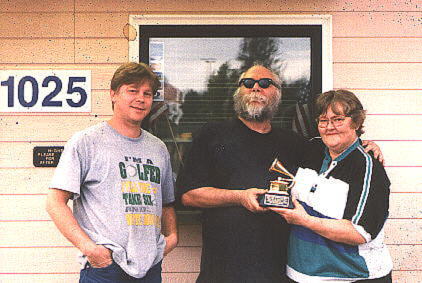
Thomas,
a motel resident and Cheryl, the resident manager of the Woodburn Inn
pose in front of the Office window, John with his Grammy. Photo taken
by a person unknown, 1998. Note spray paint residue on the photograph.
|
| He
wanted to go eat at a particular diner where a waitress he was 'involved
with' worked. I was enlisted to help him pull off a ridiculous stunt involving
balancing a glass vase on his head while gesturing for the check. He had
high hopes that the young lady would be deeply charmed. She wasn't. I was
deeply embarrassed. I started in on my discussion of his art. (We got sidetracked
into an argument over whether there is any emotional component at all to
Derek Bailey's guitar playing. (I think there is.)) It sort of didn't go
anywhere at all, but here is what I gathered. He plays music because that
is all he can do…he is too neurotic and dysfunctional to hold down
a 'real' job. (Getting paid $5000 for a day's work on the soundtrack for
'The Horse Whisperer' does, however, have its upside.) He plays music to
make money. He would like very much to make a lot of money, but he doesn't
want it badly enough to spend the rest of his life playing the music the
aging idiot hippie component of his audience wants to hear. He doesn't really
hate his old music, he hates the artistic straitjacket represented by it
and the expectations of a close-minded, nostalgic audience. Who wouldn't
get bored playing the same songs for 30 or 40 years? The younger, 'alternative'
audience that has gotten interested in his music, thanks largely to Sonic
Youth (which subject brings up its own questions about close-minded idiotic
willingness to be told what to do (youth against fascism!)), is more interested
in hearing his new stuff. |
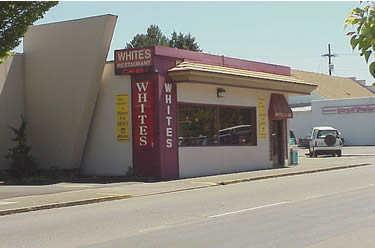
Whites
Restaurant, since 1936. John was well known here and very well liked
by the waitresses. It is within easy walking distance from the Oregon
Capitol Inn. Two eggs scrambled, no toast, side order of crisp bacon,
large iced tea, six Sweet-n-Lows was his regular order. The cook always
gave him three eggs, five or six strips of bacon.
|
| Well,
I couldn't argue with any of that. It was a lot simpler than I expected.
We drove to a pharmacy for a pain medicine prescription refill…he'd
just had some major dental work done, and was scarfing percs like no one
I'd ever seen. The Mosaic Jimmy Giuffre box set had come out recently, and
I'd taped the whole thing for him. He was working on an arrangement of one
of the tunes, and said that he'd talked to Dean about releasing some older
Giuffre stuff on Revenant. I played him some Digital Hardcore tracks, and
he surprised me with his lack of enthusiasm for Shizuo, but he liked ATR
a lot. We went back to his room, and listened to some Charlie Monroe and
looked at some more of his paintings. I was half-aware of him rooting through
his bedcovers looking for something, and realized when I saw him eating
a block of foil-wrapped supermarket blue cheese that he'd found it. |
|
III
The next summer I was
headed down to Bend for a couple of days, and stopped in to see him. I
met Melissa, who seemed friendly and intelligent and who I liked very
much. Mr. Fahey had described her to me as a Hewlett-Packard executive
and an obsessive Bob Dylan fan. I think she is at least partly responsible
for the pretty decent www.johnfahey.com web page that is well worth checking
out. I've never been very clear what exactly their relationship is, but
she agreed that it was important to get him bathing every day, and to
make him continue going to the dentist. She seemed like a take-charge-type
person, and while on occasion Mr. Fahey would groan and complain about
her, I suspect that she is exactly what he wants and needs: a bossy woman
who will make him do what he needs to do. I had the dogs with me, and
everyone got on like a house afire. I asked him about the barking dog
on 'Transfiguration…', but to my dismay, he couldn't tell me anything
about it. We all went out to lunch at Burgerville, where the best vanilla
shakes ever are made, and where one can normally obtain excellent Walla
Walla onion rings, but when the ones they were making that day arrived
they were inedible grease-sodden lumps of half cooked dough. The dogs
and Mr. Fahey loved them.
|
|
Notes
to Melissa from the author:
May 13,2001
This I believe really is going to be published soon. The editor of the
magazine, "Feminist Baseball" for which I was asked to submit
it has been putting it out for 15 years or so as a 'labor of love'; he
usually sells enough ad space to almost cover the printing costs, and
I think the cover price of the 1000 or so copies he prints helps him almost
break even. He owns a restaurant (and is the fullest-time employee) so
it takes a while to get it together sometimes. I'm glad you liked it.
your opinion of it is second only to John's in importance, and I'm very
sorry he never got to see it. I figured he would either really like it,
or really hate it...
May 22,
2001
Yes, that's the name of the magazine...john amusingly kept referring to
it as 'feminine baseball'. jim's named was asterisked to 'amusingly' 'comply'
with john's request that i not tell jim what he said. he obviously really
liked jim personally, but had little regard for his music. he was, on
the other hand, feeling VERY antagonistic towards glenn at the time, and
so the piece, i thought, reflected both attitudes. it was 'city of refuge
I'...it was a long time before i knew the title of the piece, so i left
it that way. (although the piece is all past tense, it's also sort of
'in the moment', if that makes sense). --Joe Piecuch
|
|
A
postscript from Melissa to the reader:
May 22,
2001
I am going to step out and offer a story of my own about my friend Glenn
Jones. For the record, I would be remiss if I failed to report that John
was friendly with Glenn Jones by the time of what would be their final
visit with each other. Glenn came to Salem in the summer of 2000, on assignment
to get a story from John about the making of his early Fonotone recordings.
This interview
was to have been a contribution to the to the liner notes for the upcoming
Fonotones reissue on Revenant, a project due to be released this year.
Glenn arrived bright and early, ready to begin the conversation but rather
than complying with Glenn's wishes, as he had originally said he would,
John suddenly was surly and uncooperative about it, although his attitude
changed abruptly as soon as Glenn said he understood completely and that
as far as he was concerned that was the end of it.
We went
out to a rather stiff breakfast, positions on the matter were reiterated,
ruffled feathers were smoothed, bacon was eaten. John felt better and
suggested, as you might guess, that Glenn might like to go Goodwilling,
so off we went. Then lunch, followed by a little more Goodwilling. In
the afternoon John and I locked horns in The Great Springfield Chinese
Food Incident but I won't get into that right now. Then it seems to me
we had some snacks. And, oh, I almost forgot, dinner. All in all, another
exciting outing with John Fahey, a man in constant motion if he's not
lying in bed or eating.
In fact,
a pretty good time was had by all in spite of the funny morning.
When John
died, Glenn was the first of a cadre of John's friends who arrived at
my house in preparation to attend John's funeral and subsequent memorial
service. He was perfectly delightful to be around and helped me out on
a couple of occasions when it all got to be too much and my brain temporarily
quit working. He told me his mother raised him right or he hopes so anyway.
Seems to me she did.
But this
story is does not address that. It is about John and what John did all
the time - rankle people, while those same people could not help but idolize
and adore him, he was so wonderful a character. I expect people will continue
to try to figure out John Fahey for a long, long time to come. --Melissa
Hold your
breath: Take it from me, John actually liked Boston, the oh-so-whatever
rock group. He did. He did not love them, he liked them. Aw come on, don't
we all?
back
to johnfahey.com
|
